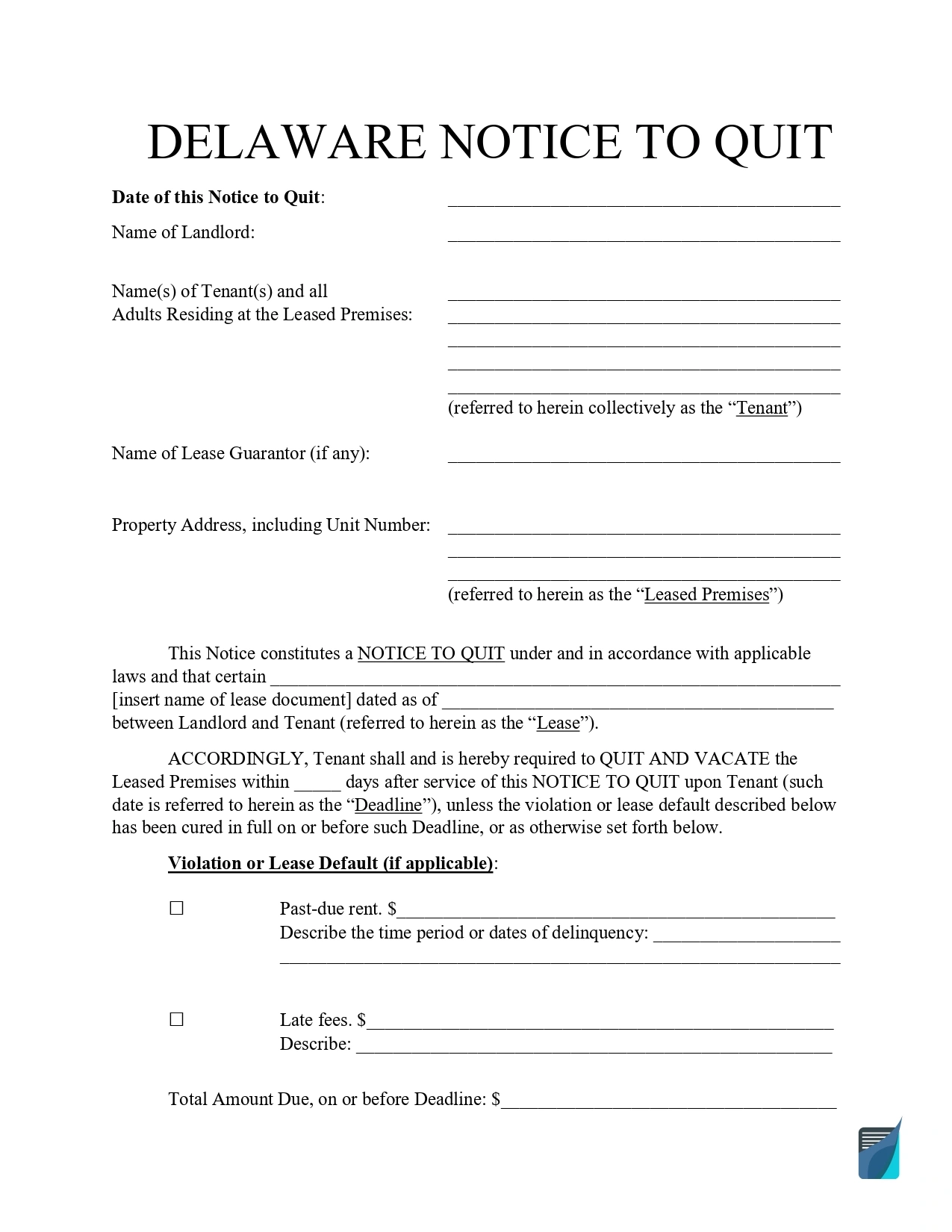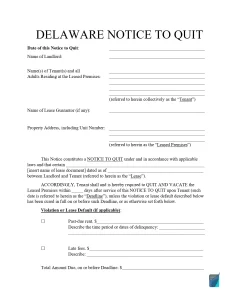Delaware Eviction Notice Forms
The Delaware eviction notice form is a document landlords must use to notify tenants of a potential eviction from their rental property. This notice must specify the reason for eviction, such as non-payment of rent, violation of lease terms, or other lease infractions. It should also give the tenant time to rectify the issue or vacate the property. In Delaware, the specific time frame and type of notice required can vary depending on the situation.
Additionally, the eviction notice form must comply with all relevant state laws, and landlords must follow the proper legal procedures when issuing this document.

Build Your Document
Answer a few simple questions to make your document in minutes
Save and Print
Save progress and finish on any device, download and print anytime
Sign and Use
Your valid, lawyer-approved document is ready
Delaware Eviction Laws
Title 25 of the Delaware Code outlines specific procedures landlords must follow to evict a tenant legally. Common grounds for eviction include non-payment of rent, violation of lease terms, damage to the property, and illegal activity. Both parties must understand that evictions can only occur after the landlord legally terminates the tenancy and obtains a court order. Self-help evictions, such as changing locks or shutting off utilities, are illegal in Delaware.
Specifically, Section 5502 of the Delaware Code defines the framework for dealing with issues such as rent nonpayment. For example, if rent is not paid on time, the landlord may issue a notice giving the tenant at least five days to pay the rent or face termination of the lease. If the tenant pays the past-due rent before an eviction action is initiated and the landlord accepts it without reservation, the eviction cannot proceed.
Delaware Eviction Notice Laws Details
| Rent Grace Period | 5 days |
| Notice of Non-Payment | 7 days |
| Notice of Non-Compliance | 10 days |
| State Laws | Delaware Code, Title 25, Sections 5501 to 5517 |
Eviction Notice Types Used in Delaware
Delaware’s legal framework stipulates various eviction notices tailored to different lease violations. This differentiation ensures that tenants are fairly warned and given appropriate time to address the issues specified by their landlords.
Notice to Pay or Quit
Delaware’s most commonly issued eviction notice for non-payment of rent is the “Notice to Pay or Quit.” Under Section 5502 of the Delaware Code, this notice grants tenants a 5-day to pay the overdue rent. If the rent is unpaid within this period, the landlord can proceed with eviction. This notice is crucial as it formally starts the eviction process for non-payment and must clearly state the amount owed and the final date by which the payment must be made.
Cure or Quit Notice
Landlords can issue a “Cure or Quit Notice” for lease violations other than non-payment of rent. As per Section 5513, this notice gives the tenant 7 days to remedy the violation or face eviction. This type of notice applies when a tenant violates noise ordinances, keeps unauthorized pets, or damages the property. The notice must detail the lease violation and outline the tenant’s actions to remedy the breach.
Unconditional Quit Notice
In more severe cases, Delaware landlords may issue an “Unconditional Quit Notice.” This notice is typically reserved for repeat offenders or severe violations such as engaging in illegal activities on the property. Under this notice, the tenant cannot cure the violation but must vacate the property immediately. This type of notice is used sparingly and must comply with Delaware’s strict legal standards to ensure it is upheld in court.

Eviction Process in Delaware
The eviction process in Delaware is strictly regulated to ensure fairness. After providing the appropriate eviction notice, if the tenant does not comply, the landlord can file for eviction with the Justice of the Peace Court. The process includes:
- The landlord files a complaint in the appropriate court, detailing the reasons for eviction and the type of notice given.
- A hearing is scheduled, typically within a few weeks. Both the landlord and the tenant have the opportunity to present their case.
- If the court rules in favor of the landlord, a writ of possession is issued, and the tenant is ordered to leave the property within a specific timeframe.
This structured process helps protect the rights of both parties and ensures that evictions are conducted lawfully.

Use our document builder to customize any template on FormsPal to your preferences. Here is a number of some other widely-used Delaware forms we provide.
Other Eviction Notice Forms by State